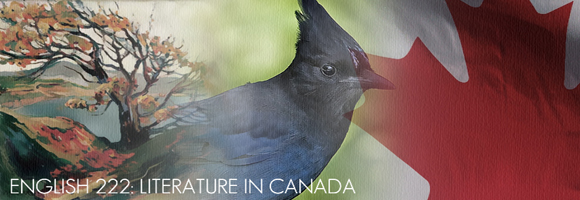
Course Description
This course is an introduction to the reading, enjoying, and critical study of Canadian Literature—poetry and prose fiction (and non-fiction)—from the earliest examples to the present. Since well before the Confederation of 1867, various versions, visions, and constructions of the nation of “Canada” have been debated. The amorphous beginnings of what is now both a “nation” and a “national” literature began to coalesce after 1867 and solidified during Canada’s involvement in World War I. The vexed question of “Canadian identity,” however, has become an ongoing and unanswered riddle. The nature and definition of the country, its literature, and its identity constitute a philosophical, psychological, political, cultural, and emotional debate which often finds literary expression. With the legislation and implementation of the contentious and problematic official governmental policy of multiculturalism, this debate has become more complex and, often, more acrimonious. The course includes the work of ethnic majority and ethnic minority writers, those who have been included in the canon of Canadian Literature and those who have been marginalized.
A close critical reading of several examples of Canadian poetry and prose will highlight important thematic and technical concerns. The multiple cultural and geographical influences—French, British, American, Native, ethnic, regional—of which the country consists and the political and historical background will also be examined and discussed.
N.B.: English 222 is not a remedial composition course. Neither does it attempt to provide a recipe for good writing. English 222 assumes that students do not have serious deficiencies in their writing; those who do should seek expert tutorial help as soon as possible.
Course Structure and Outline
Due to the breadth of coverage, the course is designed in a series of fourteen “clusters.” In each cluster, there will be from one to nine topics. Below are the clusters:
- Course Overview
- Thinking about Canadian Identity/Culture, and Canadian Literature
- Pre-1867 Reporters: Narratives of Exploration, Travel and “Discovery”
- Pre-1867 Reporters: Narratives of Settlement
- Canadian Romanticism: The Major Confederation Poets
- Canadian Modernism: Poetry
- Canadian Modernism: Fiction
- Post World War II Poetry: 1940s-1950s
- Post-World War II Short Fiction
- Native Representation: Green Grass, Running Water
- Post-World War II Poetry: 1960s-1990s
- Post-World War II Short Fiction Continued
- Post-Shoah Jewish Fiction: Barney’s Version
- Review, Final Examination Preparation, Self-Evaluation
Course Textbooks and Materials:
Required Textbooks
Students will need to purchase the following course textbooks—new or used:
- Bennett, Donna, and Russell Brown, eds. An Anthology of Canadian Literature in English. 3rd ed. Toronto, ON: Oxford UP, 2010. (This is the primary textbook for the course. It contains most, but not all, of the readings contained in the course.)
- King, Thomas. Green Grass, Running Water. 1993. Toronto, ON: HarperPerennial, 1999.
- Richler, Mordecai. Barney’s Version. Toronto, ON: Knopf Canada, 1997.
- ENGL 222 Custom Course Material
Optional Resource Texbooks
- Harmon, William. A Handbook to Literature. 11th ed. Upper Saddle River, NJ: Prentice, 2009.
- Canadian Oxford Dictionary. Ed. Katherine Barber. 2nd ed. Don Mills, ON: Oxford UP, 2004.
- Oxford Advanced Learner’s Dictionary of Current English. Ed. Sally Wehmeier. 7th ed. Oxford, Eng.: Oxford UP, 2005. [Recommended for students for whom English is a second, foreign, or additional language.]
- Fowler, H. Ramsey, and Jane E. Aaron. The Little, Brown Handbook. 11th [US] ed. New York, NY: Pearson, 2010.
- Strunk, Jr., William, and E. B. White. The Elements of Style. 4th ed. Needham Heights, MA: Allyn and Bacon, 2000.
- Griffith, Kelley. Writing Essays about Literature: A Guide and Style Sheet. 8th ed. Boston: Wadsworth, 2011.
- Hawthorn, Jeremy. A Concise Glossary of Contemporary Literary Theory. 4th ed. London, Eng.: Arnold, 2000.
Course Assessment and Requirements
Each student is expected to participate fully in all class activities (reading, writing, discussion, group work, etc.). Each student will write one short analytical paper and one longer term paper, keep a Response Journal, participate in a collaborative presentation, and sit the English 222 final examination. A student’s course mark will be determined by
the following breakdown:
| Participation |
10%
|
| Response Journal (RJ) |
10%
|
| Group Presentation |
10%
|
| Mid-Term Essay |
15%
|
| Term Paper (1,500-2,000 words = 5½-7 typed pages) |
25%
|
| Final Examination |
30%
|
|
100%
|
